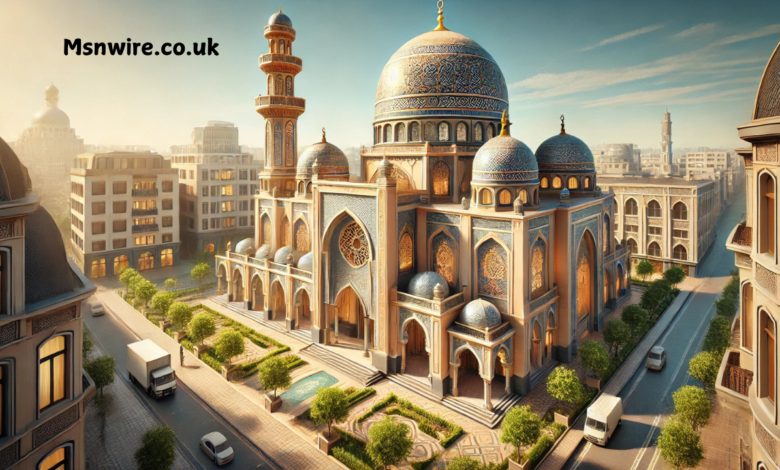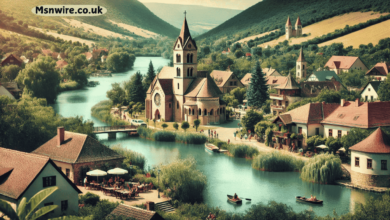Discovering Mosquee Al Nasr Koekelberg: A Beacon of Faith and Unity

Mosquee Al Nasr Koekelberg is not just a place of worship but a cornerstone of faith, community, and culture in the Koekelberg district of Brussels. Nestled in a vibrant and diverse neighborhood, this mosque serves as a spiritual haven for the Muslim community, fostering interfaith dialogue and cultural exchange. In this complete guide, we will explore the history, architecture, community significance, and artistic impact of Mosquee Al Nasr Koekelberg, uncovering what makes it a vital part of Brussels’ multicultural identity.
Historical Background of Mosquee Al Nasr Koekelberg
Mosquee Al Nasr Koekelberg was established to meet the spiritual requirements of the growing Muslim population in Brussels. Over time, this modest prayer space transformed into a thriving institution, thanks to the dedication and resilience of the local community. The name “Al Nasr,” meaning “victory” in Arabic, reflects the community’s unity and perseverance.
As immigration increased in the late 20th century, the mosque became a central hub for newly arrived families, helping them adjust to life in Belgium. Through expansions and renovations, Mosquee Al Nasr Koekelberg has become a vibrant center for worship, education, and cultural integration.
Architectural Elegance: A Fusion of Tradition and Modernity
Exterior Highlights
The architecture of Mosquee Al Nasr Koekelberg harmoniously combines traditional Islamic design with contemporary influences. While it lacks the grandeur of towering minarets, its intricate geometric patterns, calligraphy, and modest dome symbolize Islamic artistry. The façade is simple yet captivating, inviting visitors to a serene spiritual reflection space.
Interior Beauty
Inside, the mosque is a visual delight. The spacious prayer hall, adorned with elegant chandeliers, features beautifully crafted carpets and walls decorated with verses from the Quran. The mihrab, which signifies the direction of Mecca, is a focal point of devotion, enhanced by artistic calligraphy and intricate tile work—natural light streams into the mosque, creating a tranquil atmosphere for worshippers.
A Hub for Faith and Community
Religious Functions
At the heart of Mosquee Al Nasr Koekelberg is its function as a place of worship. The mosque holds five daily prayers, Friday congregational prayers, and special services during Islamic holidays like Ramadan and Eid. These gatherings are spiritual rituals and opportunities for the community to unite and commemorate their faith.
Educational Programs
Education is a cornerstone of the mosque’s mission. Programs include Quranic studies, Arabic language lessons, and Islamic history and theology workshops. These initiatives cater to children and adults, helping them deepen their understanding of Islam while fostering intellectual growth.
Social Services
Beyond religious activities, the mosque is deeply committed to serving the local community. It organizes charity drives, distributes food during Ramadan, and aids needy families. These efforts demonstrate the mosque’s dedication to uplifting Muslims and the broader community.
Cultural and Social Significance
Promoting Interfaith Dialogue
Mosquee Al Nasr Koekelberg is a beacon of interfaith harmony. The mosque builds bridges between Muslims and people of other faiths through open house events, interfaith discussions, and joint community initiatives. These efforts are instrumental in dispelling stereotypes and fostering mutual understanding in a multicultural society.
Community Events
The mosque regularly hosts cultural and social events, such as community iftars during Ramadan, Islamic festivals, and family-friendly gatherings. These activities unite people from diverse backgrounds, strengthening community bonds and promoting cultural exchange.
Challenges and Opportunities
Overcoming Prejudice
Like many religious institutions in Europe, Mosquee Al Nasr Koekelberg faces challenges such as Islamophobia and cultural misunderstandings. However, the mosque continues to combat prejudice and promote inclusivity through its educational and outreach programs.
Funding and Expansion
Another challenge is maintaining and expanding the mosque’s facilities to accommodate a growing congregation. The mosque relies on donations and community support to sustain its operations and services.
Future Aspirations
Looking ahead, Mosquee Al Nasr Koekelberg aims to enhance its role as a cultural and spiritual hub. Plans include expanding educational programs, increasing community outreach, and promoting environmental sustainability through green initiatives.
Visiting Mosquee Al Nasr Koekelberg
Location and Accessibility
Located in the serene neighborhood of Koekelberg, the mosque is easily accessible by public transport. The nearest metro station, Simonis, is just a short walk away. Visitors can also find parking nearby, though it may be limited during peak hours.
Visitor Guidelines
Visitors are invited to explore the mosque during specified hours. Modest dress is encouraged; men and women are advised to cover their limbs and legs. Women are also encouraged to cover their heads as a sign of respect. Photographs are generally allowed, but it is polite to seek permission before taking pictures inside.
What to Expect
Visiting Mosquee Al Nasr Koekelberg offers more than just a glimpse into Islamic architecture and worship practices. It’s an opportunity to experience the warmth and hospitality of a community dedicated to faith, unity, and cultural diversity.
Conclusion: A Cultural Landmark Worth Exploring
MosqueeAl Nasr Koekelberg is much more than a mosque; it symbolizes resilience, unity, and cultural richness. From its humble beginnings to its current function as a vibrant community center, the mosque exemplifies the positive contributions of religious institutions to society.



